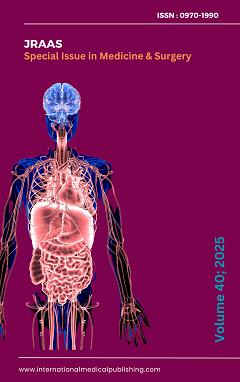Study of Serum Electrolytes in Patients Presenting with Acute Exacerbation of Chronic Obstructive Pulmonary Disease
DOI:
https://doi.org/10.71393/81bh8g62Keywords:
Acute exacerbation of COPD, hyponatremia, hypokalemia, serum electrolytes, mMRC, qSOFA, hospital outcomes, electrolyte imbalanceAbstract
Introduction: Electrolyte imbalances, particularly hyponatremia and hypokalemia, are common in acute exacerbation of COPD (AECOPD) and may worsen outcomes.
Aim & Objective: To assess the prevalence and impact of serum electrolyte imbalances, specifically hyponatremia and hypokalemia, in patients with AECOPD.
Materials & Methods: A prospective observational study included 113 AECOPD patients admitted to G.R. Medical College, Gwalior (May 2023–Sept 2024). Serum sodium and potassium were measured at admission and discharge. Clinical severity was assessed using mMRC and qSOFA scores, and associations with smoking status, ECG findings, recovery, hospital stay, and mortality were analyzed.
Results: Most patients were male (79.6%), smokers (61.9%), and aged >70 years (45.1%). Hyponatremia and hypokalemia were observed in 55.8% and 43.4%, respectively, and were significantly associated with smoking. Lower electrolyte levels correlated with higher mMRC and qSOFA scores (p<0.05). Patients with electrolyte imbalances had delayed recovery, prolonged hospitalization, and higher mortality, with the worst outcomes in those with both imbalances. ECG changes, including sinus tachycardia and pulmonale, were more frequent in patients with these disturbances.
Conclusion: Hyponatremia and hypokalemia are prevalent in AECOPD and linked to increased disease severity, longer hospital stay, and higher mortality. Early detection and correction of these imbalances are crucial to improve outcomes.


